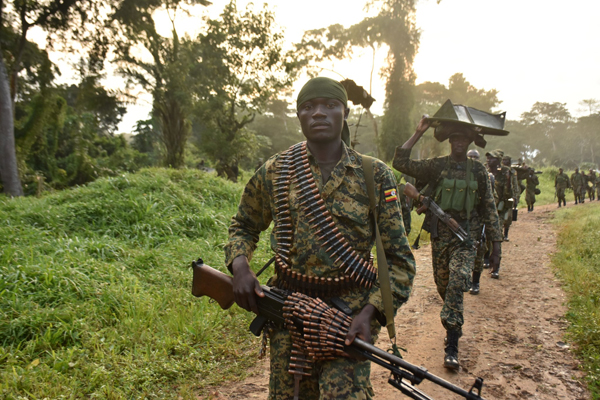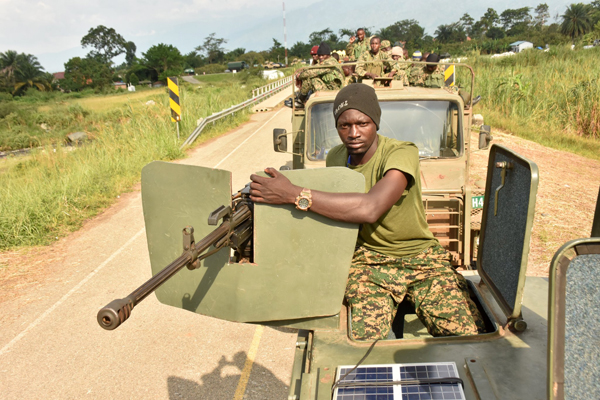Prime
Civilians must be protected as Uganda, DRC raid ADF camps- Amnesty International

A combined force of UPDF soldiers drawn from Infantry, Motorized Brigade, Artillery, Armored and Special Forces Command moved into DRC and launched an offensive operation against ADF rebels. PHOTOS/ UPDF
What you need to know:
- The ADF, a rebel group formed in Uganda in the 1990s which then fled into eastern DRC, has carried out attacks against civilians in the provinces of North Kivu and Ituri which border Uganda. According to local civil society groups, at least 6,000 people have been killed by the ADF in this area since 2013.
As the governments of Uganda and the Democratic Republic of the Congo (DRC) launch a joint military operation against the Allied Democratic Forces (ADF) rebels following recent attacks in Uganda attributed to the group, Amnesty International has called on all parties to ensure the protection of civilians and adherence to international humanitarian law.
The Ugandan People’s Defence Forces (UPDF) announced on November 30 that it had, along with its "Congolese allies," launched air and artillery strikes against ADF camps in the DRC. The information was later confirmed by the Congolese government. Residents of Nobili, a small town on the DRC-Uganda border in North-Kivu, have witnessed columns of UPDF soldiers with heavy weapons and armored vehicles crossing the border since Tuesday evening.

A combined force of UPDF soldiers drawn from Infantry, Motorized Brigade, Artillery, Armored and Special Forces Command moved into DRC and launched an offensive operation against ADF rebels. PHOTOS/ UPDF
“The situation remains volatile in eastern DRC as both Congolese and Ugandan forces continue to fight armed groups. Past foreign military interventions in the DRC, including by Uganda, have resulted in the targeting or harming of civilians,” said Sarah Jackson, Amnesty International’s deputy director for East Africa, the Horn of Africa and the Great Lakes.
“Military commanders in Uganda and DRC must take all required steps under international humanitarian law to protect and avoid harm to civilians during this operation. They must also avoid locating military facilities and soldiers near civilian homes, and where they have to do so, they must give adequate warning and evacuate people if necessary,” she added in a Friday statement.
Both the Congolese and the Ugandan armies have a track record of human rights violations and violations of international humanitarian law in the area and they have rarely been held to account, according to the human rights body.
This is premised on a 2005 ruling in which the International Court of Justice found that UPDF violated international humanitarian and human rights law during their military intervention in DRC between 1998 and 2003, including through failing to protect the civilian population, committing killings and torture of civilians and destroying villages.

“DRC has the obligation to investigate any reported violations of international humanitarian law and human rights on its territory, including by its own forces, while Uganda must investigate any allegations of violations by its forces. DRC and Uganda should ensure that there is a mechanism accessible to civilians in the area to safely report violations, should they occur,” Jackson added before adding that Amnesty International was also concerned about the risk of retaliation against civilians by ADF combatants, which may arise as in the past if nothing is done to prevent such actions.
“Protection of civilians and the respect for human rights should be at the centre of their actions. Children, older people, people with disabilities and internally displaced people must be particularly protected from harm,” said Sarah Jackson.
“Authorities must also allow access for humanitarian actors, journalists and human rights defenders to continue to do their work unhindered, including in areas where joint operations are taking place,” she added.
The operation code named, "Operation Shujja" is being commanded by Maj Gen Kayanja Muhanga.

The operation, code named, "0peration Shujja" is being commanded by Maj Gen Kayanja Muhanga
It will mainly focus on weakening identified enemy camps in Yayuwa, Tondoli, Beni One and Beni Two, according to UPDF.
Maj Gen Muhanga said the joint offensive came to fruition after a series of strategic level leadership engagements between Uganda and DR Congo.
"At tactical level we had a lot of engagements with FARDC commanders on the way forward and how the operation against ADF terrorists can be effected," Gen Muhanga said.
According to Gen Muhanga, the Operation will be reviewed every after two months at strategic level to ascertain its progress on weakening enemy forces so that war and killing of innocent civilians can end.
Maj Gen Muhanga further noted that “a lot of air force and artillery will be used on enemy camps to disrupt any further plan for war.”
He urged Ugandans and Congolese to have confidence in UPDF so that peace and security can be restored in these areas after “successful elimination of ADF.”
Recently, the combat UPDF air force and artillery launched successful attacks on enemy camps leaving thousands of casualties, according a Friday Statement from UPDF.
UPDF troops are reportedly based at Mukakati village about 18kms in North Kivu province, where Gen Muhanga has established the Forward Operations Base as a launch pad for the offensive operation against ADF terrorists.
Background
The ADF, a rebel group formed in Uganda in the 1990s which then fled into eastern DRC, has carried out attacks against civilians in the provinces of North Kivu and Ituri which border Uganda. According to local civil society groups, at least 6,000 people have been killed by the ADF in this area since 2013.

Since May 2021, a state of siege proclaimed by DRC President Tshisekedi in North Kivu and Ituri has given special powers to the army and the police to help stop attacks against civilians and “neutralize” armed groups, including the ADF. Yet such attacks have intensified in recent months, with over 1200 civilians killed according to the Kivu Security Tracker, and tens of thousands of others displaced according to the UN.
The ADF recently pledged allegiance to international terror group, Islamic State (ISIS) which has claimed responsibility for several attacks carried out in Uganda in October and November 2021 which authorities in Uganda have since attributed to the ADF.
The attacks include the recent twin bombings near Parliament and Central police Station in Kampala as well as at an eatery in Komamboga, a city suburb.




